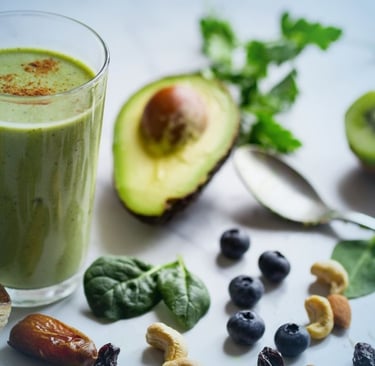Mon - Thursday: 9.30am - 5.30pm - Most Saturdays - 9am - 1pm
The Side Effects of Eating Healthy
Oxalates are a potentially harmful compound found in many foods (such as leafy greens) otherwise known as healthy.
HEALTH WELL-BEINGIMMUNE SYSTEMTOXINS
Benjamin McAvoy
11/4/20242 min read


The Side Effects of Eating Healthy
Highlights
Oxalates are a potentially harmful compound found in many foods (such as leafy greens) otherwise known as healthy.
Too-high levels may lead to a range of conditions including kidney stones and systemic inflammation.
Introduction
Green smoothie for breakfast, tofu salad with nuts for lunch, and baked potatoes and grains for dinner. As healthy as this meal plan sounds, there is one potentially harmful compound that such a meal plan is extremely high in – and that is oxalates.
What are Oxalates?
Oxalates and their acidic form oxalic acid is one of the most acidic compounds in the human body. Found as part of cellular reactions, a by-products of yeasts and fungus and other microorganisms, oxalates also enter the body through food.
When do Oxalates Become an Issue?
Oxalates may become an issue for those with a diet high in plant-based foods. Oxalates can form crystals throughout the body including in bones, joints, blood vessels, lungs, thyroid, and even the brain. These crystals are sharp in nature, and very high levels may result in increased pain and inflammation throughout the body.
High levels of oxalates are considered to be especially dangerous for those with a history of kidney stones as they can result in the formation of a certain type of stone. However, ongoing research has linked high levels of oxalates to a range of other health conditions.
Where are they found?
Oxalates are found among a wide range of foods including:
How to reduce oxalates?
Diet Modification – Low oxalate diet
Hydration – Drinking enough liquids helps eliminate oxalates from the body.
Fat Digestion – Excessive fats in diet may lead to increased oxalates. Supporting fat digestion can help reduce overall oxalate load.
Omega 3s – Increase intake of essential omega-3 fatty acids, commonly found in fish oil and cod liver oil, which reduces oxalate problems. High amounts of the omega-6 fatty acid, arachidonic acid, are associated with increased oxalate problems. Meat from grain fed animals is high in arachidonic acid.
Testing for Oxalates
The Great Plains Laboratory Organic Acids Test (OAT) test for multiple markers connected with oxalates including Glyceric Acid, Glycolic Acid and Oxalic Acid. Message me here to order an OAT test
Treating High Oxalate Levels
Antifungal Medications – Use antifungal drugs to reduce yeast and fungi that may be causing high oxalates. Children with autism frequently require years of antifungal treatment. Arabinose, a marker used for years for yeast/fungal overgrowth in the Organic Acids Test is correlated with high amounts of oxalates.
Calcium and Magnesium – Supplements of calcium and magnesium citrate can reduce oxalate absorption from the intestine. Citrate is the preferred calcium form to reduce oxalate because citrate also inhibits oxalate absorption from the intestinal tract.
Glucosamine – N-Acetyl glucosamine supplements can stimulate the production of the intercellular cement, hyaluronic acid, to reduce pain caused by oxalates.
Chondroitin – Chondroitin sulfate can prevent the formation of calcium oxalate crystals.
B6 – Vitamin B6 is a cofactor for one of the enzymes that degrades oxalate in the body and has been shown to reduce oxalate production.
Taurine – Excessive fats in the diet may cause elevated oxalates if the fatty acids are poorly absorbed because of bile salt deficiency. If taurine is low, supplementation with taurine may help stimulate bile salt production (taurocholic acid), leading to better fatty acid absorption and diminished oxalate absorption.
Probiotics – Probiotics may be very helpful in degrading oxalates in the intestine. Individuals with low amounts of oxalate-degrading bacteria are much more susceptible to kidney stones. Both Lactobacillus acidophilus and Bifidobacterium lactis have enzymes that degrade oxalates.
Other Nutrients – Supplements of vitamin E, selenium, and arginine have been shown to reduce oxalate damage.
© 2004 - 2026. All rights reserved. Benjamin McAvoy Integrative Naturopath


Recent Posts by Benjamin
Top 8 Uses of Low Dose Naltrexone (LDN) + Side Effects
Measles Virus Wipes Out Golf-Ball-Sized Cancer Tumor In 36 Hours
Ginger Tea: Dissolves Kidneys Stones, Cleanses Liver And Reduce Joint Pain
Weedkiller 'raises risk of non-Hodgkin lymphoma by 41%'
Unvaccinated Children's pose zero risk to anyone-Harvard immunologist
Benjamin Mcavoy
Email : Message Here (Use contact form)
Phone : 0422225151
Address : Settlers Blvd - Chisholm NSW 2322 Australia
Hours: Mon – Fri : 9.30am – 4.30pm
Day: Sat : 9am – 12pm - Alternate Saturday's
